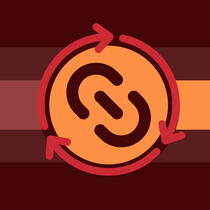all about nichelinks
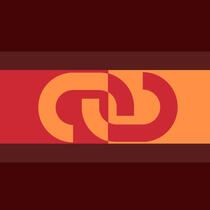
Nichelink: A newly coined niche relationship/relationship dynamic that differs from social norms, but is consensual and aware of potential risks.

general purpose nichelink flag.
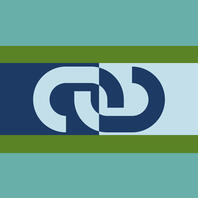
general All-Ages nichelinks flag.
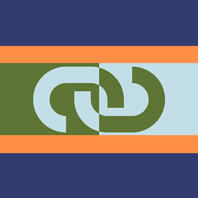
general 16+ flag.
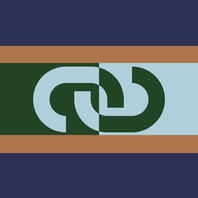
general 18+ flag.
Nichelinking is a term for relationship dynamics that differ from the norm, are probably niche, are aware of potential risks, are consensual, and are newly coined.
differ from the norm: this is flexible and vague on purpose. see the ‘examples’ section.
probably niche: niche, probably not many people will identify as this, it’s just now been invented and posted on tumblr dot com, but it’s still a valid want and identity label.
aware of potential risks: this is inspired by the kink phrase Risk-aware consensual kink or risk-accepted consensual kink (RACK), and it means that everyone in the relationship is silently nodding and acknowledging there might be risks. you don’t have to prove yourself to others on this, don’t feel expected to tell everyone your personal business on how you’re managing this risk, because it’s not their relationship…
consensual: this is inspired by the kink phrase Consensual non-consent. basically it means that everyone in the relationship agreed to have the relationship play out a certain way, and the relationship may play out (in a sort of roleplay-like fashion) like it’s non consensual, but everyone in the relationship is both expecting this to happen and still has the ultimate say on if things need to 100% stop or if it’s time for them to leave the relationship.
newly coined: i want to make it clear that existing relationship dynamics shouldn’t be shoved into this label because that feels disrespectful to those existing words, so essentially this means that existing words for it didn’t 100% describe this dynamic, so you can’t just say xyz thing is actually this term. (however, if you find one of these describes something you've already been doing for years, it's perfectly fine to start identifying with this of course.)
Examples:
relationship dynamic where one person is treated as if they are an object owned by the other/s in the relationship
relationship dynamic where one person is treated as if they are a pet owned by the other/s in the relationship
relationship dynamic where one person is treated as if they are a child adopted by the other/s in the relationship
relationship dynamic where one person is transforming the other/s in the relationship into something
relationship dynamic where two or more people genuinely consider each other found family in a very serious life-changing way
Ratings System:
labels under this umbrella have a Ratings System. it's a mandatory part of each coining.All-Ages: a label that is suitable for all ages.
16+: a label that would be best if it was only used by people 16 years or older (bodily) all terms under this umbrella that involve identity modification or training are inherently 16+ as a part of the definition of nichelink.
18+: a label that is inherently not suitable for people under 18 years (bodily).Some reasons for a label to be rated All-Ages:
1) it doesn’t describe anything very serious or life-changing
2) it doesn’t entail anything not safe for minors/NSFW in any way
3) nothing described in the coining post seems inherently harmful even if misunderstoodSome reasons for a label to be rated 16+:
1) it includes the intention of identity modification (all nichelinks that include this are inherently 16+)
2) it entails slightly more serious topics which someone under 16 would have a harder time handling, but doesn’t entail anything not safe for work/sexual.some reasons for the label to be related 18+:
1) it inherently involves sexual content or kinks (minors can have sexual thoughts and urges, duh, but i don't think it's a good idea to openly display your sexual interests online as a minor, and i feel using a sexually-charged or kinky term online is doing that.)
2) it involves very intense identity modification, such as hypnosis or otherwise putting your partner into an altered state of mind.Grammar:
nichelinking: the state of being in this kind of relationship with someone else. “we’re nichelinking,” “we might start nichelinking”
nichelink: 1) the specific terms themself. “i coined a nichelink,” “definition: an all-ages nichelink where you…” 2) the relationship itself. “our nichelink,” “his last nichelink”
nichelinker: someone who participates in nichelinking.
desiring to be in a nichelink/having a nichelink "crush" is called a nudge.
Inspiration and Links:
These terms inspired the coining, and if you identify with one of these you might also like nichelinking.
roleplay
found family tropes
my own personal experience of becoming someone’s “dad”: i made a friend in high school who i came out as transgender to, and then as a joke based on how people in the undertale fandom called toriel “mom,” we began referring to me as my friend’s “dad.” this joke stuck and then started genuinely being a serious part of our friendship. reflecting on this made me realize that there’s actually lots of relationships in life that’re similar, where you refer to each other as something unusual and it feels like it changes the entire status of your friendship. i liked the idea of making a word someone can use for this kind of friendship/relationship if they wanted.
Q: So what do these relationships entail?
The specifics are going to depend on the exact term but in general:
how 1 person treats the other/s when referring to them, speaking to them etc
roleplaying
how the person/s in the relationship picture each other
what the person/s in the relationship expect from each other
Q: Is this anti radqueer?
I don’t find it makes sense to say that something that isn’t a stance term/blankqueer term is anti this or pro that. But this term was inspired by radqueer “consensual abuse” relationships, and i did start working on this because i saw that there were a lot of people who craved a specific relationship dynamic or way of being treated who felt like they couldn’t get that outside of the radqueer community, so i wanted to make a risk-aware and safer alternative that is not attached to a harmful community known for abuse, transphobia, racism, etc.if you crave being treated a certain way, yes even in a “harmed” way, this term is welcome to you.Consent as defined by this term:
the internet has a Weird skewed idea of what consent is, so this is how consent is being defined when it comes to nichelinking.
consent occurs when one person voluntarily agrees to the proposal or desires of another. For example, "do you want to be the Dog to my Owner like how it's described in this post?" Consent means the voluntary agreement of everyone who wants to be in the nichelink to engage in what it says it would entail, without abuse or exploitation of trust, power or authority, coercion or threats. Consent can also be revoked at any moment.Nichelinks that involve kink, are rated 18+, or involve identity modification shouldn’t just be implied consent and should be openly discussed at the outset. Depending on the exact details, advanced consent may be okay - This part is too varied to make an all-out ruling, so please use your best judgement to keep yourself and the other/s safe from violence and dangerous activities.Implied consent: Implied consent is consent inferred from a person’s actions and the facts and circumstances of a particular situation (or in some cases, by a person’s silence or inaction). Examples include unambiguously soliciting or initiating sexual activity or the implied consent to physical contact by participants in a hockey game or being assaulted in a boxing match.
Advance consent: Where consent is given entirely in advance.Q: Is this a kink?
no, it’s not intended to be. you can use one of these terms at any age in a completely non-sexual way.
however if you’re an adult and you find a term appealing and start to use it because of kink things, more power to you, go right ahead. There's a pride flag for kink-related nichelinks here.Q: What do you mean by identity modification?
identify modification is well, the practice of modifying someone else’s identity for them, usually by subtle suggestion or training them. -ification kinks are arguably the most commonly known form of this, but you can want this for completely sfw reasons. there are many reasons that someone may want to have someone else modify their identity. alterhumanity, exomemories, trauma, system reasons, atypical dysphoria/euphoria, etc.but this is also a really serious thing to do and it just isn’t logical or healthy for someone who is younger than 16 to enter a nichelink for the purpose of identity modification. any younger than this, and your identity is still forming and can undergo drastic changes, especially since you’ve likely not finished puberty or high school, both of which are especially FILLED with changes and development to your identity.Q: Can I transition into this?
it wouldn’t be accurate to say this is something you can transition into. using one of these terms can be part of your transition journey. or if you’re using one of these terms because of dysphoria, it would be accurate to say you’re doing it to dysfirm.Q: Can I coin my own?
see here.Q: Is there an emoji code?
no, and i don’t want there to be one, so please don’t make one. the link emoji/shape of a link is used as an alternative to hearts and "love" when saying "i 🔗 you" though.Q: Can I post this term on...
wiki/term definition sites: yes, and you don't have to ask, but i would like to be informed.
pinterest/other social medias: no, never, i'm not comfortable with someone else posting my term for me i decided this is a silly hill to die on, so you can go ahead now. just make sure it is clear that this carrd is the source for the term please.
Other Notes:
nichelinks don't have to involve attraction. you can get into a nichelink simply because you want the dynamic. but they can involve it, and i enjoy the idea of someone who uses teritary attraction labels and/or alteraffectis labels getting into a nichelink because it lets them express that. that's very cool.
instead of saying "i ❤️ you", and "i love you," you can say "i 🔗 you" and "i link you."
generally nichelinks are phrased as (thing)+(thing). i did this on purpose. i didn't want to make it (thing)/(thing) with a slash because (although rarer now) i see people use this to mean fandom ships. and i also didn't want there to be any confusion between nichelinks and (gender)x(gender) / (thing)4(thing) terms, because i want nichelinks to be able to be completely platonic or feature no attraction at all if people want. so, i chose a plus sign.
this rule can be broken if it seems fitting though, and examples of it being broken are Morality Pet, Fated Rivals, and Fire-Forged Friends.
nichelink terms are intended to be specific relationship terms. you can't be a "general" (nichelink term) for anyone/everyone, it's something specific you do with another person. i consider it a sort of alternative to "transitioning" when it comes to dissodic and desirdae (or similar) terms that mention how the user wants to be treated or perceived.
or something you do with multiple people. all nichelinks are open to having multiple people in the relationship/polyamorous behavior.
i don't think fiction-based terms fit nichelink unless what you're wanting is a specific relationship invented in that media. in most cases i can imagine, i think it would be better to just coin a general term for the dynamic two characters have. like instead of coining a (teacher character) + (student character) it makes more sense to coin/use a general teacher+student nichelink.
examples i can think of for "only exists in that media" being: kid+patron troll (Homestuck), dragon+rider (HTTYD), watcher+slayer (Buffy the vampire slayer).
by definition, nichelinks can't involve incest, rape, zoophilia, pedophilia, or anything else completely nonconsensual. there cannot be a nichelink term that inherently involves attraction to your relative. "but my incest is-" no. "but my dog is-" no.
Nichegroups are a sister term to nichelink, and refer to dynamics between a group of people. A newly coined and mostly likely niche dynamic between a group of acquaintances that differs from social norms, but is consensual and aware of potential risks. It may come with specific predefined roles and tasks, or be more relaxed.
[Coining post]
differ from the norm: this is flexible and vague on purpose. some examples could be a colony of cats, a pokemon trainer and their pokemon, a herd of cows, or a diamond and their court.
probably niche: niche, probably not many people will identify as this, it’s just now been invented and posted on tumblr dot com, but it’s still a valid want and identity label.
aware of potential risks: this is inspired by the kink phrase Risk-aware consensual kink or risk-accepted consensual kink (RACK), and it means that everyone in the relationship is silently nodding and acknowledging there might be risks. you don’t have to prove yourself to others on this, don’t feel expected to tell everyone your personal business on how you’re managing this risk, because it’s not their relationship…
consensual: this is inspired by the kink phrase Consensual non-consent. basically it means that everyone in the relationship agreed to have the relationship play out a certain way, and the relationship may play out (maybe in a sort of roleplay-like fashion) like it’s non consensual, but everyone in the relationship is both expecting this to happen and still has the ultimate say on if things need to 100% stop or if it’s time for them to leave the relationship.
newly coined: i want to make it clear that existing relationship dynamics shouldn’t be shoved into this label because that feels disrespectful to those existing words, so essentially this means that existing words for it didn’t 100% describe this dynamic, so you can’t just say xyz thing is actually this term. (however, if you find one of these describes something you've already been doing for years, it's perfectly fine to start identifying with this of course.)
Grammar:
nichegrouping: the state of being in this kind of relationship with someone else. “we’re nichegrouping” “we might start nichegrouping since we're all dogkin”
nichegroup: 1) the specific terms themself. “i coined a nichegroup,” “definition: an all-ages nichegroup where…” 2) the relationship itself. “our nichegroup scheduled a party tomorrow,” “his last nichegroup broke up”
nichegrouper: someone who participates in nichegroupings or wishes to.
nichegroupies: the people in your nichegroup (general term, you can also just call them your friends, partners, or whatever word is used in the definition of a term, such as calling them "gems")
nichegroups are titled as [thing] Nichegroup, but you can of course drop "nichegroup" when you're talking about it outside of the official title because this can make sentences really fucking long. for example, saying "our Diamond Court Nichegroup" every time would be awful:
Consent as defined by this term:
the internet has a Weird skewed idea of what consent is, so this is how consent is being defined when it comes to nichelinking and subset terms.
consent occurs when one person voluntarily agrees to the proposal or desires of another. For example, "do we want to do this?"
Consent means the voluntary agreement of everyone who wants to be in to engage in what it says it would entail, without abuse or exploitation of trust, power or authority, coercion or threats. Consent can also be revoked at any moment. Terms that involve kink, are rated 18+, or involve identity modification shouldn’t just be implied consent and should be openly discussed at the outset. Depending on the exact details, advanced consent may be okay - This part is too varied to make an all-out ruling, so please use your best judgement to keep yourself and the other/s safe from violence and dangerous activities. In general, I don't think implied consent is enough to start a nichegroup, and you should have an actual discussion about it with your group, even if it only ends up being a simple "do we want to do this?" "yeah" "ok."Implied consent: Implied consent is consent inferred from a person’s actions and the facts and circumstances of a particular situation (or in some cases, by a person’s silence or inaction). Examples include unambiguously soliciting or initiating sexual activity or the implied consent to physical contact by participants in a hockey game or being assaulted in a boxing match.
Advance consent: Where consent is given entirely in advance.Age Ratings:
nichegroup labels follow the same Ratings System as nichelink does. age ratings are put in place to prevent situations like for example, a 14 year old seeking a relationship with a 20 year old having dominance over them, and are a mandatory part of the definition of terms.
i apologize in advance for any inconveniences this may cause, but this is a part of the definition, and ignoring it would be like identifying as bungender without feeling like your gender is related to bunnies.if you're out of the age range for a term, here are some things you can do while you wait:1) Spend the time before your birthday thinking about and writing about what specifically you want out of the relationship, maybe even drafting some type of agreement or contract (or some other list of boundaries) between you and your future partner
2) keep working on it and editing it until your birthday, adding or removing things after thinking on them
3) saving up money to get specific items you will want to wear/use/etc for it
4) researching how to safely do specific things for it
Q: Is there an emoji code?
No, and i don’t want there to be one, so please don’t make one. however, like how you can use the link 🔗 emoji in nichelinks as a substitute for a heart, to say "i 🔗 you," in nichegroups you can use the connected paperclips emoji to say "i 🖇️ you."Q: Can I coin my own nichegroup?
Yeah, go ham.
Other Notes:
every rule about age ratings i already mentioned for nichelinks still applies here. if it involves erotic content, it's automatically 18+. if it involves modifying someone's identity or training them, it's automatically 16+. i will continue to update the faq on the nichelink carrd so i really implore you to read that over if you haven't yet.
there is some crossover between nichegroups and nichelinks, and if you aren't 100% sure whether your relationship should be one or the other, that's okay. people in a nichegroup can also be in individual nichelinks, whether separate from the nichegroup's theme or related to it.
nichegroups should never encourage harm on purpose. by nature, this term cannot include asking your nichegroupies to self injure, not drink or eat, or engage with content that will trigger their delusions or triggers.
currently, to prevent harm, nichegroups directly intending to imitate religion or cults specifically are not permitted. sorry.
similar to nichelinks, your nichegroups can be completely devoid of attraction and something you do just because you want that dynamic. people in one nichegroup may have differing reasons for wanting it, and discussing if everyone is okay with that should be part of it.
Everyone can coin nichelinks and nichegroups now that I'm finished. I originally limited coining due to anxiety.Text Templates and Notes
I will not be updating this Rentry after 5/20/2025, so others are invited to make their own archive.
Recent Work
Sed dolor amet dictum
Eleifend eu integer ac sapien
Rhoncus hendrerit odio consequat
Ipsum interdum nunc ultrices
Contact
